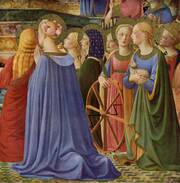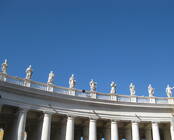The Saints
BXVI: "Day after day the Church offers us the possibility of walking in the company of the saints. Hans Urs von Balthasar wrote that the saints constitute the most important message of the Gospel, its actualization in daily life, and therefore represent for us a real means of access to Jesus. The French writer Jean Guitton described them "as the colours of the spectrum in relation to light", because with their own tones and accentuations each one of them reflects the light of God's holiness. How important and useful, therefore, is the commitment to cultivate knowledge of and devotion to the saints, alongside daily meditation on the Word of God and filial love for Our Lady! (20.08.2008)
Saints Pope Benedict XVI spoke about in his catechesis series are included in this section of Totus2us, along with those who have been the subject of a papal encyclical or apostolic letter:
St Albert the Great
St Aloysius Gonzaga
St Alphonsus Liguori
St Andrew Bobola
St Angela of Foligno
St Anthony of Padua ![]()
St Barnabas
St Benedict of Nursia ![]()
St Bonaventure
St Boniface
St Bridget of Sweden
St Catherine of Bologna
St Catherine of Genoa
St Catherine of Siena
St Charles Borromeo
St Chromatius of Aquileia
St Clare of Assisi
St Columba
St Crispin of Viterbo
Saints Cyril & Methodius
St Dominic Guzman ![]()
St Elizabeth of Hungary
St Eusebius of Vercelli
St Faustina Kowalska
St Francis of Assisi ![]()
St Francis de Sales
St Germanus of Constantinople
St Gertrude the Great
St Hildegard of Bingen
St Ignatius of Loyola
Ss Jacinta & Francisco Marto
St Jerome Emiliani
St Joan of Arc
St John of Avila
St John Bosco
St John Climacus
St John of the Cross
St John Eudes
St John Leonardi
St John Mary Vianney ![]()
St Josaphat Kuntsevych
St Josemaría Escrivá
St Joseph Cafasso
St Joseph Cottolengo
St Juliana of Cornillon
St Justin
St Lawrence of Brindisi
St Leonard Murialdo
Ss Louis & Zelie Martin
St Maria Goretti
St Mary Magdalen ![]()
St Matilda of Hackeborn
St Maximilian Maria Kolbe
St Odo of Cluny
St Peter Canisius
St Philip Neri
St Pio of Pietrelcina
St Robert Bellarmine
St Romanus the Melodist
St Rose of Lima
St Stanislaus
St Stephen
St Tarcisius
St Mother Teresa of Calcutta
St Teresa of Jesus (aka St Teresa of Avila)
St Teresa Benedicta of the Cross (aka Edith Stein)
St Theodore the Studite
St Thérèse of the Child Jesus (aka St Therese of Lisieux) ![]()
St Thomas Aquinas
St Thomas More
St Timothy & Titus
St Veronica Giuliani
BXVI : " .. Their human and spiritual experience shows that holiness is not a luxury, it is not a privilege for the few, an impossible goal for an ordinary person; it is actually the common destiny of all men called to be children of God, the universal vocation of all the baptized. Holiness is offered to all; naturally, not all the saints are equal: in fact, as I said, they are the spectrum of divine light. Moreover, a saint who possesses extraordinary charisms is not necessarily a great saint. Indeed, there are a great many whose names are known only to God, because on earth they led an apparently perfectly normal life. And precisely these "normal" saints are those habitually desired by God. Their example testifies that only when we are in touch with the Lord can we be filled with his peace and his joy and be able to spread serenity, hope and optimism everywhere. Bernanos, a great French writer who was always fascinated by the idea of the Saints, - he mentions many in his novels - considering the variety of their charisms, notes that "every saint's life is like a new blossom in spring." May this also happen for us! Let us therefore permit ourselves to be attracted by the supernatural fascination of holiness! May Mary, Queen of all Saints, Mother and Refuge of sinners, obtain this grace for us!" (20.08.2008)
The Communion of Saints 
Francis: ".. And we come to another aspect: the communion of saints goes beyond earthly life, goes beyond death and lasts for ever. This union among us goes beyond the here and now and continues in the next life; it is a spiritual union that is born of Baptism and is not broken by death, but, thanks to the Risen Christ, is destined to find its fullness in eternal life. There is a deep and indissoluble bond between all those who are still pilgrims in this world — between us — and those who have crossed the threshold of death to enter into eternity. All the baptised here on earth, the souls in Purgatory and all the blessed who are already in Paradise form one big Family. This communion between earth and heaven is realised especially in the prayer of intercession. Dear friends, we have this beauty! This is a reality of ours, of everyone's, that makes us brothers, that accompanies us on the pathway of life and is found by us once again in heaven. Let us go forward on this pathway with trust, with joy. A Christian must be joyful, with the joy of having so many baptised brothers and sisters who walk with him; supported by the help of brothers and sisters who are on the same road towards heaven; and also with the help of brothers and sisters who are in heaven and pray to Jesus for us. Let us go forward on this road with joy!"
Papa Benedetto: "We are all called to holiness: it is the very measure of Christian living... Let us not be afraid to aim high, for God’s heights; let us not be afraid that God will ask too much of us, but let ourselves be guided by His Word in every daily action, even when we feel poor, inadequate sinners. It will be He who transforms us in accordance with his love."
Papa Benedict XVI's Catechesis on the Significance of Martyrdom
General Audience, Wednesday 11 August 2010 - in Croatian, English, French, German, Italian, Portuguese & Spanish
"Dear Brothers and Sisters,
Today in the Liturgy we commemorate St Clare of Assisi, Foundress of the Poor Clares, a luminous figure. But this week we are commemorating several holy martyrs, from the early centuries of the Church such as St Lawrence, Deacon, St Pontianus, Pope, and St Hippolytus, Priest; and from the nearer past, such as St Teresa Benedicta of the Cross, Edith Stein, Patroness of Europe, and St Maximilian Mary Kolbe. I would then like to reflect briefly on martyrdom, a form of total love for God.
On what is martyrdom founded? The answer is simple: on the death of Jesus, on his supreme sacrifice of love, consummated on the Cross, that we might have life. Christ is the suffering servant mentioned by the Prophet Isaiah, who gave himself as a ransom for many. He urges his disciples, each one of us, to take up his or her cross every day and follow him on the path of total love of God the Father and of humanity: "he who does not take his cross and follow me", he tells us, "is not worthy of me. He who finds his life will lose it, and he who loses his life for my sake will find it" (Mt 10: 38-39). It is the logic of the grain of wheat that dies in order to sprout and bring new life. Jesus himself "is the grain of wheat which came from God, the divine grain that lets itself fall to the ground, that lets itself sink, be broken down in death and precisely by so doing germinates and can thus bear fruit in the immensity of the world" (Benedict XVI during his Visit to the Evangelical Lutheran Community, Rome, 14 March 2010). The martyr follows the Lord to the very end, freely accepting death for the salvation of the world in a supreme test of love and faith (cf Lumen Gentium, n 42).
Once again, where does the strength to face martyrdom come from? From deep and intimate union with Christ, because martyrdom and the vocation to martyrdom are not the result of human effort but the response to a project and call of God, they are a gift of his grace that enables a person, out of love, to give his life for Christ and for the Church, hence for the world. If we read the lives of the martyrs we are amazed at their calmness and courage in confronting suffering and death: God's power is fully expressed in weakness, in the poverty of those who entrust themselves to him and place their hope in him alone. Yet it is important to stress that God's grace does not suppress or suffocate the freedom of those who face martyrdom; on the contrary it enriches and exalts them: the Martyr is an exceedingly free person, free as regards power, as regards the world; a free person who in a single, definitive act gives God his whole life, and in a supreme act of faith, hope and charity, abandons himself into the hands of his Creator and Redeemer; he gives up his life in order to be associated totally with the Sacrifice of Christ on the Cross. In a word, martyrdom is a great act of love in response to God's immense love.
Dear brothers and sisters, we are probably not called to martyrdom, but not one of us is excluded from the divine call to holiness, to attain the high standard of Christian living, and this entails taking up our daily cross. All of us, especially in our time when selfishness and individualism seem to prevail, must take on as a first and fundamental commitment the duty to grow every day in greater love for God and for our brothers and sisters, to transform our own lives and thereby transform the life of our world too. Through the intercession of the Saints and Martyrs let us ask the Lord to set our hearts on fire so that we may be able to love as he has loved each one of us.


